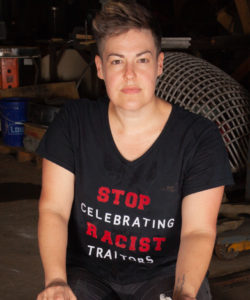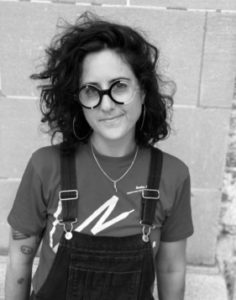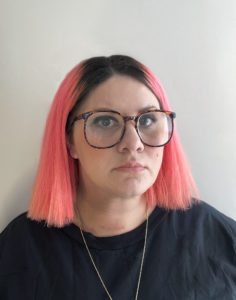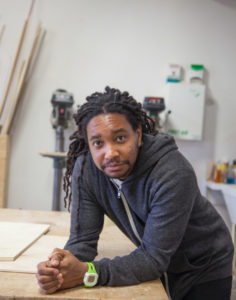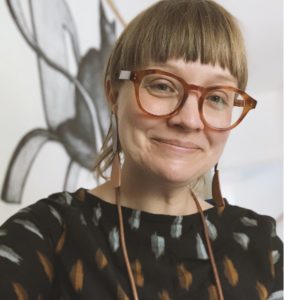Conference Schedule
Tuesday, November 2
Pre-Conference Workshop Part I:
Foundations of Equity
Time: 11:00am – 12:00pm EST
Justice in arts research, practice, and pedagogy must start with close examination of the foundations upon which arts institutions have been built. In part one of a two-part workshop series, we’ll discuss reimagining arts spaces from the ground up; the contingency of justice-oriented practice; and building foundations for liberation in art making, arts research, and arts pedagogy.
Facilitators:
Interlude: Healing Journey
Time: 12:15-12:30pm EST
Healing Journey is an interactive audio-visual performance depicting the process of healing past trauma or unpleasant memories by transcending oneself to celebrate rebirth and transformation.
Presenter:
Pre-Conference Workshop Part II:
Dismantling Critique
Time: 12:45 – 2:00pm EST
In part two of the two-part workshop, we interrogate how white supremacy and colonialism have shaped our systems for feedback and assessment, and build and share new strategies and tools for feedback and critique that are rooted in accountability, transparency, reciprocity, and justice.
Facilitators:
Wednesday, November 3
Steps Towards Change Pedagogy Panel
Rewriting the Story: Practical Strategies for an Anti-racist Classroom
Time: 11:00am-12:00pm EST
During last year’s Art for Politics’ Sake roundtable, our discussants examined the role art, research and art education can play in eradicating racism. This year, we hope to continue and build on the theoretical groundwork established in their discussion by exploring concrete examples of putting anti-racist principles into practice in the classroom. Instructors in this roundtable will discuss with the a2ru community anti-racist practices and diversity initiatives they have already implemented and those they hope to institute in their classrooms, studios and labs.
Participants:
Mental Health
Time: 12:30-1:05pm EST
Reclaim
Storyteller:
I’ve devoted my life to investigate through the arts, create new performance pieces and teach young artists. In 2018 my life changed forever. My two sons were diagnosed with a severe progressive muscle-wasting condition. Everything stopped. I was suddely paralyzed. This is the story about my journey as a “rare” mom and performance artist.
If I Looked Like What I’ve Been Through
Storyteller:
In this performance poetry piece, I will offer a map of my mental health journey and the ways in which art, and those who gifted me with art, has provided what the world–too loud and too close–had struggled to. I will discuss how arts have allowed me to build deep, rich human connections with others and to not overcome, but thrive alongside the unique ways in which I move through the world. Spoken word has taught me how to embody and build new worlds.
Sticks and Stones
Storyteller:
In Sticks and Stones, the narrator comes to terms with the fact that his mental illness, though separate from his history with toxic masculinity, reflects the ways toxic masculinity kept him from acknowledging his reality for too long. Drawing helped him identify what he was struggling with. It is the act of drawing, not the product, that helps sustain his mental health.
Light and Shadow, Trauma and the Arts, Or: Art-Informed Higher Education of the Future
Storytellers:
This shadow puppet spoken word poem performance dramatized the traumas of 2020 at the intersection of isolation and connection, online technology and education, and investigates how the Arts, Arts-informed education and online technologies can support healing through trauma-informed and arts-integrated education.
Pedagogy
Time: 1:30-2:05pm EST
The Hundred Languages of PhDness
Storyteller:
As a PhD student and teacher educator, the current moment has made me aware of the importance of arts integration at the graduate level. Often we are given narrow assignments and ways to communicate our thinking and work, which is a direct contradiction to what we ask preservice teachers to offer to young children. If we want to teach preservice teachers how to utilize arts-based pedagogy, we must learn through the arts ourselves and validate it within the university.
FUGITIVE: Escaping Disciplinary Bounds
Storytellers:
FUGITIVE was an advanced research-based seminar and speaker series at the University of Virginia the explored spatial and temporal connotations of this term through intersecting material, human and environmental lenses. Whether molecules, people, or landscapes, things get loose, move around, and change, fade and disappear. We will share student and faculty perspectives on this transdisciplinary program, from planning to pandemic online execution. Enhancements to traditional graduate and undergraduate curricula, along with plans to expand upon this approach through the new tranSci lab and associated programs will be presented.
Matter Matters in Storytelling: Using Puppets and Material Performance in R1 Institutions
Storyteller:
This brief tabletop puppet piece demonstrates why puppetry belongs in a research institution and what it can contribute to research methodologies. Using a meta approach, I explore the topic visually, thinking through puppetry techniques for the audience. The performance touches on key elements of the broad field of object or material performance and the opportunities it offers to think through specific puppetry techniques, while also revealing some of the fundamentals of the art form.
Keynote Panel: Performing Public Health
Time: 2:15-3:30pm EST
Panelists:
Performing Public Health (PPH) was an initiative within the University of Florida Center for Arts in Medicine’s (UFCAM) COVID-19 Arts Response that considered both the crucial cultural measures needed to slow the spread of COVID-19, and the various ways artists perform culture-making in response. PPH tracked and supported the impact of COVID on the arts through its three working groups: an Advisory, Unique Precarities, and Remote Cultures. Each group contributed materials and perspectives to the considerations of the initiative, with the greater group gathering consistently to reflect and reconsider.
This keynote will be presented as an open conversational format, with teams commenting on each others’ work and sharing photos, videos, or PDFs as an expanded archive of the project.
Conference attendees are asked to consider and answer the following questions over social media (#performingpublichealth and #artistknowledges).
-
how do we center artists in fields that are not designed to center them?
-
how does intuitive arts making intersect with data-driven science?
-
how do we learn from marginalized artists to create expansive institutional programs, processes, practices and structures?
-
how do artists change institutionalized practices?
-
how do definitions of research both support and limit artists?
-
what if, for instance, health/medicine is in the arts, rather than arts in health/medicine?
Interlude: The Mindful Art Pause: How Can The Arts Impact Our Community’s Health?
Time: 3:45-4:00pm EST
Storytellers:
Our project’s story offers a hypothesis and the development of an arts integration project in response: Could the structure of mindfulness practice provide a practical framework to deliver arts-based experiences to healthcare workers? Could taking just three minutes during the workday at the hospital or healthcare facility shift individual perspectives and culivate compassion, self-awareness and opening to being present? Could this arts-mindfulness practice impact and support team members and teams themselves in the hectic world of healthcare? Our story will share how we have worked with this hypothesis in developing the Mindful Art Pause.
Keynote: A Case for Creative Cultural Leadership
Time: 4:30-5:30pm EST
Speaker:
Minneapolis College of Art and Design’s president Sanjit Sethi will offer a keynote address, “A Case for Creative Cultural Leadership,” informed by his leadership of MCAD, Corcoran School, and Santa Fe Art Institute. Synthesizing vital messages on the themes of cultural leadership, shared power and resilience gleaned from his collaborative, curated 2020-21 series “Slow Burning Fire,” his last-lecture style keynote will inform the possibilities for exchange between art and design schools and research universities to better foster arts-centered and community-engaged research.
Thursday, November 4
Steps Towards Change Student Panel
Telling the BIPOC Story: Artivism during COVID-19
Time: 11:00am-12:00pm EST
Panelists:
The racial and economic inequalities of our education system were laid bare as students moved out of campus classrooms and into differently resourced spaces that came to house their virtual classrooms during the height of the pandemic. At the same time, BIPOC communities were disproportionately affected by both the pandemic and police violence. With communities needing a way to express themselves, protests, vigils, retaliation, and then more protests became a regular occurrence in many cities and a mainstay on all media outlets. In this panel, students will use recent projects and experiences to address the questions: Amidst the disruption of your space and the rise in opportunities for activism, what role did art play in your life? Would you have described yourself as an activist prior to the pandemic? How has your relationship to arts and activism–artivism–changed as our country has grappled with the racial and economic inequalities that have always existed in our society, and that have been made more evident by COVID-19? Do you see a place for artivism in your university? How might you integrate your artivism into your academic work?
Exchanging Knowledge
Time: 12:30-1:00pm EST
Creative Curation: What Artists are Teaching Librarians
Storyteller:
My story is about the exchange of knowledge that happens behind academia’s back, the meticulous archives that only appear in family albums rather than special collections, the libraries made of what researchers throw away or overlook, and the artists doing this work. My story is about new knowledges, new modes of organizing knowledge, new ways to be a librarian and how these new concepts are found in museums, galleries, and artists’ studios, not in our research libraries. And I want to tell the story of how academic librarians look to these librarian-artists for guidance on how to collect what we’re ignoring, organizational structures that allow every student to find materials no matter what language they speak, and ways to tell the histories that scholarly publishing doesn’t–but I can’t quite tell that piece of the story yet. I can’t tell that story because librarians don’t see their work as a creative act. Because the organization, curation, and collecting happening in academic libraries is governed by rules, tradition, and more and more by algorithims.
Engaged Storycraft is/as Everywhere
Storyteller:
My story draws parallels between the present ubiquity of story and ubiquitous storytelling, as the latter emerges from the expansions of mobile digital computing and social media in the early 2000s. I draw from my experience turning from a traditional literary scholar and academic teaching fiction, science fiction, and digital storytelling since 2004 to taking on the role of Founding Director of the Center for Engaged Storycraft at RIT in 2018. Storytelling, in my experience, might well inform creative arts practices of many kinds in its capacity as a “re-orientation device” (Sara Ahmed) that both registers shifts in how and why we engage with stories, and also performatively facilitates our re-attunement to invaluable modes of relating, sharing, listening, and gathering knowledges from a variety of disciplines and social sites in the present. Whether in my work with Engineering faculty on story-driven learning, or in my work with French computer scientists and digitial literary scholars, storytelling has been a key, creative and epistemological driver for building more equitable present-ist, and applicable modes of scholarly exchange though this is, of course, not the only possible outcome here and is not without its own challenges.
Telling Stories Without Words: The Making of “The Vortex”
Storytellers:
This is the story of using dance and drawing to convey the emotional impact of scientific culture on researchers who are women, people of color, or gender-nonconforming. An artist, choreographer, and scientist collaborated to create a performance and video titled “The Vortex” based on the stories of historical and contemporary researchers, in the process interacting with many scientists and tracing common patters from their stories in the major themes of the performance. The artists will show a segment of work and weave the story of that segment into their own story of making the work and its reception.
Public Health
Time: 12:30-1:00pm EST
Layers of Reflection: Digital Stories in Medical Education
Storytellers:
An interdisciplinary research team of medical educators, researchers, and arts educators share a digital story created by them to reflect on the importance of Digital Story-making as a tool for reflection for medical students. Mirroring the student experience of making a digital story, the team will tell the story of what moves the medical students to choose their topic for reflection and how their artistic choices contribute to their reflection process. The team will advocate for how this assignment creates a critical pause for students and educators alike to consider choice, nuance, style, and personhood in the complex system of healthcare and the position and agency of new physicians within it.
Coming Together While Apart: Connecting Campuses and Communities Toward Improving Systems and Health Equity
Storytellers:
In response to a global pandemic during which we experienced a shared challenge, teh Health Humanities and Arts Research Collaborative, a cross-disciplinary, interprofessional collaborative that grew out of the University of Kansas Medical Center and Lawrence Campus, offers insights into how to make space for artists, humanists, health researchers, and community agencies to address common problems together, bringing their respective expertise to the conversation. HHARC servess as a model for connecting, co-creating, and responding to timely, real-world challenges, while relying on creativity, expertise, and co-created strategies to generate and build new solutions. Co-facilitators share their story.
Ground Works Panel: Understanding Vibrant Ecologies of Research
Time: 2:00-3:15pm EST
Panelists:
In this panel, we explore the forthcoming publication Vibrant Ecologies of Research (VER), a special collection for a2ru’s online peer-reviewed publication Ground Works. (https://groundworks.io/). VER seeks to deepend our understanding of institutional, social and epistemological systems that effectively weave arts-based inquiry into the scholarly fabric of research. In this way, VER calls attention to the complex ways that institutions, research groups, and organizations come together, and what elements allow them to thrive. Reviewed submissions provide concrete examples of research ecosystems as well as jumping-off points for VER editorial staff, contributors, and session participants to discuss and analyze ecologies of research, through the lens of Ground Works and its unique multimodal publishing format. Participants should expect discussion focused on the vitality of arts-based inquiry in spaces of research that extend, augment, or mutate conceptions of knowledge, ethical decision-making, and accessibility to research cultures.
Music
Time: 3:45-4:15pm EST
Virtual Projects with the Living Earth Show: Music for Hard Times and Queer Objects
Storytellers:
Motivated by hope instead of despair, the Clarice Performing Arts Center embarked on a radical planning strategy for our 2020-21 season. We presented a virtual season to our audiences focused on engagement and education for University of Maryland (UMD) students. We continue to be committed to supporting artists. And since we are part of a research university, our commitment to the education of students is one of our primary core values. In December, the Clarice and the UMD School of Music presented a one-of-a-kind aural experience in collaboration with visiting artists from The Living Earth Show (TLES) (Andy Meyerson and Travis Andrews), composer Danny Clay and the UMD Wind Orchestra. “Music for Hard Times” is an “open sourced” composition resulting in a piece that can never be replicated. Throughout the semester, Danny guided members of the UMD Wind Orchestra in creating various unique recordings that Danny and The Living Earth Show wove into UMD’s own version of “Music for Hard Times.” The world premiere was part of a special virtual event where audience members heard the piece and from the composer and musicians about their artistic process in creating the piece. About 70 students from the School of Music participated in the 8-week long project during fall semester 2020.
Jacktrip Network Music Technology and Remote Art Integration
Storytellers:
This story starts with a collective improvisation piece and then moves to further storytelling about the Jacktrip network music technology behind the theme that made this collaboration happen. The conversation follows with a discussion about Jacktrip’s 20-year history and its contribution to remote music collaborations, music education, and art integration.
Perspectives
Time: 3:45-4:20pm EST
Double Vision: Seeing Patient Conditions & Narratives Simultaneously
Storyteller:
Seeing Patient Conditions & Narratives Simultaneously elevates patient narratives by re-designing a condition-specific medical text to include them. This piece combines visual design with response poetry to create a portrait of a patient’s experience and present a new way for healthcare providers to receive it.
Disability Studies and Arts-Based Research as Self-Reflexive Practice
Storyteller:
Through the lens of critical disability studies, an individual with invisible disabilities will share their lived experience navigating the intersection of being an artist, educator and researcher. Through the use of storytelling and visual narratives, the presenter will emphasize the value of the arts to untangle the complexity of the disability experience and advocate for using the arts as a way to understand and appreciate diversity in the art classroom.
The Heart of the Matter
Storyteller:
2020 revealed and made visceral many perpetual public health challenges that plague the United States, including challenges impacted by race and racism. 2020 also reminded many people of what is most important in life, such as connection and happiness. Whether addressing social determinants of health or existential determinants of health, 2020 was a demonstration of how valuable arts and culture are in cultivating and empowering narrative. Narrative provides researchers, practitioners, educators and the public with the necessary context to truly address health challenges in a manner attuned to the lived experiences of populations the field is charged to serve. The change the world needs begins with telling the stories…our stories.
Multiple Narratives
Storytellers:
Follow the interwoven stories of arts educators, researchers, and students searching for meaningful ways to expand access to the world of art, seeking answers to questions: What if art education spaces start the process of viewing art by establishing a brave place for viewers to share their prior knowledge and lived experiences? How can shifting the way we approach visual engagement inspire more accessible exchanges? Multiple Narratives, an inclusive pedagogy, supports the facilitation of authentic connections between art and viewers’ intersectional identities, to shape equitable futures through imaginative education.
Interlude: Li Chiao-Ping Dance/Here Lies the Truth, part ii
Time: 4:30-4:45pm EST
Artists:
The work Li Chiao-Ping Dance has created, “Here Lies the Truth, part ii,” brings audience members into a shared space to experience the power of this cross-disciplinary work utilizing dance, poetry, and video. The call to action for Li Chiao-Ping Dance is to hold ourselves and everyone around us accountable for ways in which we can effect the change that we seek for a more just and equitable society. Our work is to be done within our dance group and continued outwardly to the people we interact with directly and indirectly. Our goal in presenting “Here Lies the Truth, part ii” to to express the importance of dance, its power to speak our felt truths, and to express our story of the past year. In this screendance work “Here Lies the Truth, part ii,” the narrative encompasses performativity, isolation, space/place, personal/social identities and responsibilities, individuality and collective thinking, and finally, groundedness and connectedness.
Keynote Panel: Staging Incarceration–Artmaking in & About U.S. Prisons
Time: 5:00-6:00pm EST
Panelists:
In this keynote panel, artist-scholars will share their work creating theatre with and about incarcerated individuals. Drawing on their experiences in prison settings around the United States, the panelists will address questions such as: How can this work reveal the racist, classist, and sexist forces at work in the US carceral system? What are the challenges and unique possibilities of collaboration with incarcerated artists? What are the impacts–intentional and/or unintentional–of this work? Can artmaking in this setting be a catalyst for change?
Friday, November 5
Storytelling
Time: 11:00am-12:00pm EST
Hi-Tech/Hi-Touch: Crafting the Hybrid Fashion Generation
Storyteller:
Soft Wearables showcases Hi-Tech/Hi-Touch prototypes that illustrate how tactile, hands-on making is combined with computation and digital design. Interdisciplinary design students created functional, flexible smart textile prototypes that can sense and react to environmental stimuli. Each team created a 1-minute video short to illustrate their project concept, process, and a demonstration of their working prototype. This will be a feature of the 10 best projects from 2016-present.
Brick Meets Pixel
Storytellers:
Brick Meets Pixel is a narrative containing stop-motion animations made by students that required the time-based moving of physical materials, working with lighting and a small camera, and editing all into a cohesive whole. The purpose was to allow students from all disciplines to work with the physicality that surrounds us to create a digital product. The discovery was that the physicality requires practice and the individual voice comes through when the student has to make the selection of materials themselves.
Experiments in Animation & Storytelling: Searching for Visual Translations Between Analog and Digital Realms
Storytellers:
We are a team of artists, designers, writers, imaginiative thinkers, and makers working collaboratively on a new multi-media artwork titled Dream which is produced through printmaking, animation, and storytelling. With Dream, we seek to visually stretch the boundaries of storytelling via analog and digital realms of art–making into a multi-media experience. Our collaborative work imagines a range of eventualities, from invented and hybridized narratives to unexpected scenarios suggested through visual and audio representations. As written, visual and audio amalgamations and translations emerge through our collaborative work; they form new narratives and scenarios that exist precisely because of such calculations. For the 2021 a2ru National Conference, we propose to share how each part of the project, storytelling (writing), drawing, photography, printmaking, sculpted props, digital animation, and audio editing, informs the otehrs. We will discuss how analog images serve as blueprints and how, via digital animation, our individual and collective experiments are brought into animated film.
Hózhó-Centered Arts Management Praxis: Using a Diné Arts and Placeknowing Framework
Storytellers:
Hózhó-centered arts and cultural strategies are important in raising awareness and encouraging Diné artists of their worth and contributions to our historical and present-day cultural economy. This is explored through skit performance and facilitated dialogue with audience and speakers of a dynamic Diné College’s Bachelor’s of Fine Arts Program and University of New Mexico’s Indigenous Design and Planning Institute partnership.
Home is ___: A Participatory Reflection on the Meaning of Home
Is home where we are born or where we live? Is home a right or is it earned? Is home a place or is it the people we live with or is it a certain relationship to nature? Over the past year, our notions of home have radically shifted. The “Home is ____” project invites participants to respond with a word or image to create a collective understanding of home that critically reflects on inequities that have been laid bare over the course of the pandemic. Responses are passed through custom filtration/design that outputs squares of cross-stitch that are combined together in an interactive quilt.
Performance
Time: 12:15-12:45pm EST
Performing the Self on Screen
Storyteller:
Screendance embodies both figure and landscape and frames the moving body in its relationship to the screen as well as to its cultural and physical environment. Rather than dismissing the moving body as a kind of “dumb show” reserved for athletics or dance, screendance has the potential to elevate or make visible the body as a political being; choices in casting, movement, costume, setting, sound and narrative challenge both professional and student to “make meaning” for an increasingly disembodied audience via digital media and internet. This 5-minute video essay integrates dance, video art, painting, music and ideas into a call for a renewed democracy of intelligent bodies on screens of every shape and size.
Embracing Bewilderment: An Experience of How
Storytellers:
For a2ru’s 2021 Conference: Sharing Stories, GROUNDWORK will exemplify how we 1) encourage participants to embrace bewilderment and 2) use that state of bewilderment to inspire interdisciplinary connection. Our story revolves around a biologist and a fiber artist who discovered an innovative solution to prosthetics using mulberry fiber during a GROUNDWORKS retreat. Our 5-minute presentation will splice together recorded, interactive interviews with responsive Impro performances borrowed from classical clown practice to move beyond straight narration and into a space of play, presence, and experience for participants and audience alike. Thus, the presentation will not only tell but show how GROUNDWORK’s delicate balance of known/unknown, inner/outer experience, and head/whole body thinking energizes and inspires curiosity, connection, collaboration and innovative thinking.
Conversation, Collaboration, Connection
Storyteller:
How can you teach dance partnering when you’re not allowed to touch? In Spring 2021 I used Black vernacular dance techniques to offer my students skills of conversation, collaboration, and connection, all while maintaining a safe social distance. This dance film highlights the value, and the joy, that marginalized and non-canonical forms can bring to our programs.
Pedagogy II
Time: 12:15-12:50pm EST
Building Empathy in Early Childhood: A World Music Story
Storyteller:
This story advocates for the thoughtful and intentional integration of musical empathy building into early childhood education. Using musical clips, photos, and quotes from the children, this story explores the triumphs and challenges of tackling these important issues in the early childhood years. Further, this story considers these encounters as a model for crafting future age-appropriate approaches to integrating music and empathy building in the early childhood years, a point of departure for developing social and emotional skills through the arts.
Opening Windows Every Two Weeks
Storyteller:
No doom in zoom if you’ve got poetry. No need to be all in one place. Every two weeks a zoom window opens and poetry from students, teachers and would-be writers rushes in. Whether you share your poems…make this space your new place for a poetic state of mind.
Arts Education Community/Ecosystem
Storytellers:
Our interdisciplinary story will ask participants to re-imagine how cross-institutional collaboration can be galvinized in a time of pandemic and social/cultural upheaval to support the role of the arts and arts integration in learning. The hope is to create spaces for participants to reimagine pathways of learning not only through a health pandemic and virtual lens, but a cultural and emotional stance that calls for a new vision of education. Join us as we reimagine teaching and learning in ways that will inform us to partner for a new era.
History
Time: 1:15-1:45pm EST
Integrating Art History and Video Games for General Education
Storyteller:
This talk outlines the general education art history-game design course taught as part of the artistic perspectives category. The course is project based and students use the free game engine Unreal 4 as well as free art and sound assets to explore ideas of art and art history.
Longhouse Lessons: Co-Creating a Virtual Seneca Longhouse
Storyteller:
In format, the story is a single player, first person, adventure game. The plot is simple. You are a nine-year old Seneca girl learning to make stew. But the objects with which you interact have stories of their own. And in learning about the artifacts throughout the Longhouse, you learn about the Haudenosaunee both past, present, and future. The virtual experience was developed in partnership with Ganondagan New York State Historic Site, and will be introduced to teachers at its Educator’s Day in August 2021.
Augmented Reality as a New Storytelling Medium
Storyteller:
Using augmented reality as a new storytelling medium, RIT’s Frameless Labs is building an interactive, locative augmented reality (AR) project in Rochester, NY. The project will digitally reconstruct the architecture and clearly contextualize the history of the Clarissa Street corridor, a once-thriving African American commercial district, that dates back to 1810 and was destroyed after the Rochester 1964 racial uprisings, urban renewal, and redlining. The use of AR will bring to life the former bustling neighborhood, overlaying historically accurate 3D models of demolished buildings at their former location, in contrast to the stark vacant lots remaining today. The history of this neighborhood is vitally important to understanding race and inequality in Rochester and other cities across the nation and our intention is to engage immersive technology to deepen public understanding of the African American experience.
Artmaking Workshop
Finding Form in the Void: A Collaborative Inquiry into How Artmaking Helps Us Generate New Stories About Our Collective Future
Time: 1:15-1:45pm EST
Facilitators:
Arts education renders people more capable of telling different stories about the future, and weaving them together with the stories of others. As educators, we are obligated to foster this capacity if we want to have a story that’s ongoing for all of us. Materializing ideas through collaborative artmaking builds our capacity to probe the unknown; new possibilities are pulled from the void when we are given the space to open windows into, and reflect upon, each other’s imaginiations. In this collaborative storytelling experiment, we will use an artmaking activity to engage with our material surroundings, creating new forms that can be shared across the virtual workshop space and act as the basis for generating collective stories.
Interlude: The Visit
Time: 2:30-2:45pm EST
Storytellers:
“The Visit”–a collaborative project that combined research on race in Tuscaloosa, musicology, theatre and film. This presentation will share excerpts from a speak delivered by Booker T. Washington to a mixed audience of black and white citizens in Tuscaloosa. Audience members will be encouraged to participate in a Call and Response iteration of one of the Spirituals performed on the original program.
Keynote Panel: In the Circle of Sound
Time: 3:00-4:15pm EST
Facilitators:
Music City connects, supports, and celebrates music-making communities in Orange, New Jersey, a city fragmented by decades of sorting by race and by class. Rooted in principles of Restoration Urbanism and Collective Recovery, Music City reweaves the city’s social fabric and reconnects its fractured spaces, bringing its many parts together as a harmonious whole. Music City is a program of the University of Orange, a free school of restoration urbanism. Members of our team will share stories and media from our work.
Keynote and Performance: Athens Hip Hop Harmonic
Time: 4:30-5:30pm EST
Presenters:
The Athens Hip Hop Harmonic is a collective of local Hip Hop artists and University of Georgia music faculty/students that seeks to use music to celebrate the intersection of our musical, cultural, and racial identities. This session features the world premiers of co-created, boundary-breaking works by three pairs of Hip Hop artists and UGA faculty composers, with a live narrative and audience Q&A focused on the artistic inquiry and creative process that built this collaboration.

